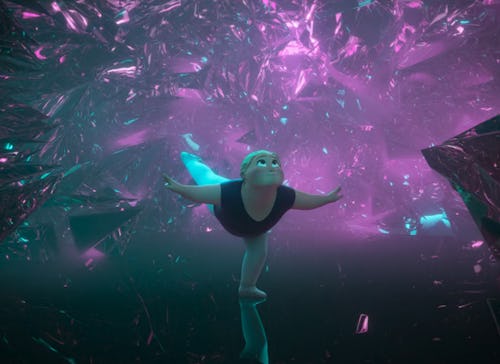
Let’s be honest: Disney isn’t exactly known for inclusivity, and it has more than a few problematic movies in its vault. But over the last few years, Disney has been taking steps to showcase more diverse characters and stories (though not always hitting the mark). We saw it with 2020’s Out, a short film about a gay man coming out to his parents, and with the inclusion of a trans character in Baymax earlier this year. And now, we’re finally being introduced to our first plus-size protagonist in Reflect.
The six-minute animated short streaming on Disney+ welcomes Bianca, a young dancer in ballet class, to the small screen. She’s passionate about the craft, but appears disappointed when she sees her reflection in the mirror, sucking in her belly and lifting her chin up to fit in. Almost immediately, Bianca is transported to a barely lit room, where mirrors reign supreme and the young dancer comes face-to-face with her reflection at all angles. This, of course, is meant to symbolize the body dysmorphia she’s experiencing.
“Setting the story from a dancer’s perspective seemed just natural,” director Hillary Bradfield said in an interview immediately preceding the film on Disney+. “It’s a part of the craft to be looking at your posture and checking things in the mirror, so it just seemed like a really good way to put her in that environment where she has to look at herself and she doesn’t want to.”
Fortunately (spoiler alert), Bianca’s love for dance trumps her feelings of inferiority, as each of her swift dance moves shatters the reflection she had been criticizing earlier. It’s what jumpstarts her body-positive journey.
“When people watch the short, I hope that they can feel more positively about themselves and how they look and feel okay about the tough parts of their journey,” Bradfield, who also spoke of her own experience, said in the interview. “Sometimes you go to the dark place to get to the good place. And that just makes the good place that much more beautiful.”
Overall, the reception for Reflect has been positive, with one Twitter user tweeting, “16-year-old me needed this Disney short before I quit ballet because I didn’t want to be the fat girl in class anymore. I’m glad little ones will have this.”
But the question remains: Why must Disney’s first plus-size main character be featured in a story that solely focuses on body image? “The fat experience is so much more than just the fatphobia we experience & this doesn’t feel like true representation,” one person tweeted. Another called out Disney directly: “Hey Disney, now do fat characters that aren’t tragic and whose stories don’t revolve around their weight?”
At the end of the day, we shouldn’t discount the progress that’s already been made; it’s a step forward. But we can celebrate that progress while also recognizing that it took far too long, and acknowledging that it’s still not enough. We can only hope that with time, we’ll have an overwhelming amount of media to choose from that not only highlights characters of all genders, sizes, and races, but does so in a well-rounded, relatable way.







